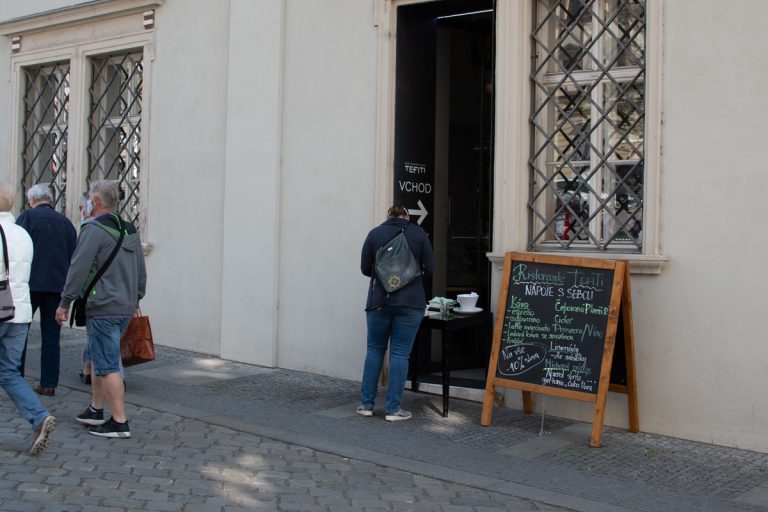No-one was prepared for the pandemic or predicted the extent of the disruption it would bring. But for restaurants, the disruption has hit harder than for most. From country to country, the gastronomy sector was usually among the first to be locked down due to the pandemic, despite the basic function they provide. Now, more than ever, it is the collective responsibility of citizens to sustain the businesses that feed them and keep the city buzzing. Photo: KK / Brno Daily.
Brno, Nov 2 (BD) – When it comes to culinary delights, Brno’s restaurants have a lot to offer, and the city’s international reputation as a gastro destination has been growing steadily in the last few years. The range of interesting dining options, in the enchanting setting of a “fairy-tale” city leaves a lasting impression on the minds and taste buds of visitors long after they have left. But the pandemic has had a disastrous impact on Brno’s eateries, turning them into ghost spaces.
The Czech Republic handled the early months of the coronavirus well, leading Prime Minister Andrej Babiš to boast that the country was among the “best in Covid.” But this situation has recently changed drastically, and the Czech Republic is now one of the worst hit countries in the European Union.
Restaurant sales decreased by up to 90% in the first days of the initial lockdown in March. Business gradually increased after that thanks to street sales and deliveries, and by the end of April, sales were back up to around 70% of pre-pandemic levels, according to Nicolas Eich, CEO of Edenred CR, in an interview with business website Roklen24.
According to a September survey by Storyous and the Association of Small and Medium-Sized Businesses and the Self-Employed (AMSP), published in Cesky rozhlas, one in three business owners in the gastronomy sector are considering complete closure, and 80% of restaurant, pub and bar owners have serious concerns about the future of their business. On average, their sales have fallen by 60%, and many are operating with zero profits, according to the survey. “Most gastro-business will end this year with a loss of hundreds of thousands to millions of crowns,” AMSP estimated.
“The gastronomy sector has already lost sales of at least CZK 30 billion, and by the end of the year this number is estimated to increase to CZK 45-50 billion (without taking into account any further restrictive measures),” AMSP stated on its website on September 18th, before the second round of restrictions were announced.
For Le Ba Thuan, manager of Go Vietnamese in Brno city centre, “we believe that food has the ability to connect people. Seeing customers enjoying our meals makes us really happy.” This is a sight the manager is now missing out on, as the restaurant is running just a home delivery service.
There is no doubt that every sphere of our lives is being transformed by the coronavirus pandemic and may never return to the previous status quo, but restaurants in particular have been brought to their knees, with little hope for the future. “It is really hard to say right now. The situation is very unpredictable. But we are trying to stay hopeful,” said Thuan.
Thuan added that “customers ordering food through a particular delivery service have doubled, but customers buying food through the window are only about 15% of our previous sales,” which is too low to cover other expenses the restaurant has to meet to keep running.
Even with the home deliveries, there are additional financial troubles incurred by the struggling businesses. “We can still sell our food through delivery services, but the fee for the service is quite high, which is understandable for the good job that they are doing. But the restaurant’s income is too low to cover all the costs of staff and rent.”
Surviving the Crisis Demands a Collective Effort
Pandemics threaten the whole community, and tackling it requires collective responsibility. For Thuan, to survive the virus means “to take care of each other and your health, to be kind to each other, and to help each other through this difficult period.”
As the government introduced measures to curtail the virus, Thuan’s restaurant has continued to support front-line workers. “In March, we donated our food to hospitals in Brno, including St. Anne’s Hospital and University Hospital in Bohunice, to let the doctors at the front-line know that we all are very grateful for their brave hard work.”
In spite of the decline in sales, Thuan said that his restaurant plans to resume their donations to support the healthcare workers. “This time, with the second wave of covid-19, as soon as we are able to stabilise, we want to donate our food to the doctors at the hospitals again and give them our support.”
Restaurants in Brno also need the public’s support to get through these tough times. Thuan acknowledged that they are receiving support from customers who are ordering online, and said he hopes that customers keep using the other restaurants they cherish as well.
“The support that our customers and friends are giving us so far is amazing. We really need them right now. In these circumstances, having our customers buy our food through delivery services is the best option to help us to get through this.”







